|
|
|
Sort Order |
|
|
|
Items / Page
|
|
|
|
|
|
|
| Srl | Item |
| 1 |
ID:
171356
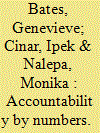

|
|
|
|
|
| Summary/Abstract |
In an era of democratic backsliding, scholars and policymakers wonder if failure to reckon with former authoritarian elites and their collaborators plays a role. Yet without adequate data on the way former autocracies and countries emerging from conflict deal with human rights violators, it is hard to tell if new democracies are unstable because of their failure to reckon with their former authoritarian elites or despite it. We introduce a dataset of personnel transitional justice events that allows scholars to answer such questions, disaggregating these events temporally from the date of a country’s democratization. The time series nature of our data allows scholars to measure key characteristics of states’ dealing with their past and complements existing transitional justice datasets by focusing not only on post-conflict societies and not only on post-authoritarian societies, but on both. To showcase the possibilities our data affords scholars, we use it to develop three novel measures of personnel transitional justice: severity, urgency, and volatility. The granular structure of our data allows researchers to construct additional measures depending on their theoretical questions of interest. We illustrate the use of severity of transitional justice in a regression that also employs data from the Varieties of Democracy project.
|
|
|
|
|
|
|
|
|
|
|
|
|
|
|
|
| 2 |
ID:
171350
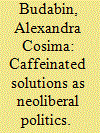

|
|
|
|
|
| Summary/Abstract |
How do celebrities exert power to influence elite and popular thinking and policy around peace and development? Drawing from research on neoliberalism, celebrities, and ethical consumption, I build an interpretive analysis of two case studies of Brand Aid initiatives to argue first, that celebrities mobilize financial and political capital to create partnerships across businesses, NGOs, and the government in ways that embody neoliberal politics by ushering in new private actors; and second, that celebrities reinforce these neoliberal politics by promoting these partnerships to popular and elite audiences. I discuss how this paper contributes to unmasking neoliberal trends by showing how celebrities are deepening their engagement in ways that hold implications for democratic politics.
|
|
|
|
|
|
|
|
|
|
|
|
|
|
|
|
| 3 |
ID:
171349


|
|
|
|
|
| Summary/Abstract |
Celebrity humanitarianism has been transformed in its scope, scale, and organization in the last thirty years. Its flourishing has generated considerable academic interest from a wide variety of disciplines that share two characteristics. First, these studies are—unusually—well connected, which means that different disciplines have not tended to develop their own separate literatures, but learn from each other’s approaches. This makes it useful and important to identify ways different disciplinary approaches can complement each other. Second, most of this attention has focused on politics of celebrity humanitarianism in the global North. Yet focusing also on the South and on North/South relations will move the field forward. We argue that celebrity humanitarianism must be interpreted through the broader systems of which it is a part. We offer a heuristic typology of celebrity humanitarianism that continues to bridge between different disciplines and which identifies ways in which political science can complement existing studies. We also use this typology to refocus work on the politics of celebrity humanitarian relations away from merely Northern politics. This approach allows us to identify what sorts of politics and political solutions are being advocated by current forms of celebrity humanitarianism.
|
|
|
|
|
|
|
|
|
|
|
|
|
|
|
|
| 4 |
ID:
171348
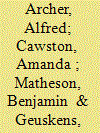

|
|
|
|
|
| Summary/Abstract |
What, if anything, is problematic about the involvement of celebrities in democratic politics? While a number of theorists have criticized celebrity involvement in politics, none so far have examined this issue using the tools of social epistemology, the study of the effects of social interactions, practices, and institutions on knowledge and belief acquisition. We will draw on these resources to investigate the issue of celebrity involvement in politics, specifically as this involvement relates to democratic theory and its implications for democratic practice. We will argue that an important and underexplored form of power, which we will call epistemic power, can explain one important way in which celebrity involvement in politics is problematic. This is because unchecked uses and unwarranted allocations of epistemic power, which celebrities tend to enjoy, threaten the legitimacy of existing democracies and raise important questions regarding core commitments of deliberative, epistemic, and plebiscitary models of democratic theory. We will finish by suggesting directions that democratic theorists could pursue when attempting to address some of these problems.
|
|
|
|
|
|
|
|
|
|
|
|
|
|
|
|
| 5 |
ID:
171351
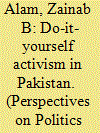

|
|
|
|
|
| Summary/Abstract |
In July 2016, Pakistani social media celebrity Qandeel Baloch was asphyxiated by her brother and gained posthumous celebrity in the West where her death was sensationally categorized as an honor-killing. Yet Qandeel was a celebrity in her own right among South Asians long before her death. Through skillful use of social media, she created new forms of public space and used them to challenge dominant social norms and political practices. I examine Qandeel’s “do-it-yourself activism”—her innovative use of the digital public sphere to position herself as a worthy representative of Pakistani nationality; to critique long-established norms governing gender, class, and sexuality; and to expand the boundaries of national belonging in Pakistan to include culturally rebellious women of limited economic means. By examining Qandeel’s audacious means of standing for Pakistan, her deployment of marriage proposals as a mode of subversive political activism within the political party, Pakistan Tehreek-e-Insaf (Pakistan Movement for Justice, PTI), and her use of visual culture (“selfies”) to challenge the moral authority of a powerful Islamic cleric, I theorize a form of political activism grounded in women’s agency that deploys celebrity to illuminate and politicize injustices.
|
|
|
|
|
|
|
|
|
|
|
|
|
|
|
|
| 6 |
ID:
171355
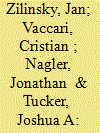

|
|
|
|
|
| Summary/Abstract |
Michael Jordan supposedly justified his decision to stay out of politics by noting that Republicans buy sneakers too. In the social media era, the name of the game for celebrities is engagement with fans. So why then do celebrities risk talking about politics on social media, which is likely to antagonize a portion of their fan base? With this question in mind, we analyze approximately 220,000 tweets from 83 celebrities who chose to endorse a presidential candidate in the 2016 U.S. presidential election campaign to assess whether there is a cost—defined in terms of engagement on Twitter—for celebrities who discuss presidential candidates. We also examine whether celebrities behave similarly to other campaign surrogates in being more likely to take on the “attack dog” role by going negative more often than going positive. More specifically, we document how often celebrities of distinct political preferences tweet about Donald Trump, Bernie Sanders, and Hillary Clinton, and we show that followers of opinionated celebrities do not withhold engagement when entertainers become politically mobilized and do indeed often go negative. Interestingly, in some cases political content from celebrities actually turns out to be more popular than typical lifestyle tweets.
|
|
|
|
|
|
|
|
|
|
|
|
|
|
|
|
| 7 |
ID:
171352


|
|
|
|
|
| Summary/Abstract |
It is widely assumed that celebrities are imbued with political capital and the power to move opinion. To understand the sources of that capital in the specific domain of sports celebrity, we investigate the popularity of global soccer superstars. Specifically, we examine players’ success in the Ballon d’Or—the most high-profile contest to select the world’s best player. Based on historical election results as well as an original survey of soccer fans, we find that certain kinds of players are significantly more likely to win the Ballon d’Or. Moreover, we detect an increasing concentration of votes on these kinds of players over time, suggesting a clear and growing hierarchy in the competition for soccer celebrity. Further analyses of support for the world’s two best players in 2016 (Lionel Messi and Cristiano Ronaldo) show that, if properly adapted, political science concepts like partisanship have conceptual and empirical leverage in ostensibly non-political contests.
|
|
|
|
|
|
|
|
|
|
|
|
|
|
|
|
| 8 |
ID:
171353


|
|
|
|
|
| Summary/Abstract |
The convergence of sports and celebrity can have a powerful influence on everyday politics, especially for groups underrepresented in mainstream American society. This article examines the relationship between race, celebrity, and social movements, specifically Colin Kaepernick’s protest of police violence and whether his activism mobilizes black Americans to political action. Using the 2017 Black Voter Project (BVP) Pilot Study, we explore African American political engagement in the 2016 election, a time devoid of President Obama as a mobilizing figure. We find African Americans who strongly approve of Kaepernick’s protest engage in politics at elevated rates, even after accounting for alternative explanations. Moreover, approval for Kaepernick also moderates other forces rooted in group identity, such as identification with the Black Lives Matter movement. In the end, Kaepernick and the protest movement he leads offers a powerful mobilizing force for African Americans.
|
|
|
|
|
|
|
|
|
|
|
|
|
|
|
|
| 9 |
ID:
171354
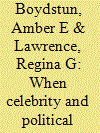

|
|
|
|
|
| Summary/Abstract |
While the rise of celebrities-turned-politicians has been well documented and theorized, how their bids for office are treated by the establishment press has been less closely examined. Research on celebrity politics on the one hand, and on journalism standards on the other, have rarely been brought into conversation with one another. Here, we draw from both literatures to explore how the press covered Donald Trump’s 2016 presidential campaign. Prior research on political journalism would likely have predicted that Trump, with his lack of conventional political experience and a career in reality TV, would have been treated to derisive, dismissive press coverage, which we refer to as “clown” coverage. But Trump’s fame and wealth, and the high entertainment value of his campaign, would also lead the media to cover him heavily. We argue that the collision of entertainment-infused politics with traditional journalism practices created a profound dilemma for the press’s ability to cover the campaign coherently, and that the press responded to this dilemma by giving Trump as much clown-like coverage as serious coverage, throughout not just the primary but also the general election. We support our argument through qualitative evidence from interviews with journalists and other political insiders, and quantitative evidence from a content analysis of New York Times and Washington Post coverage of Trump at key points throughout the campaign.
|
|
|
|
|
|
|
|
|
|
|
|
|
|
|
|
|
|
|
|
|